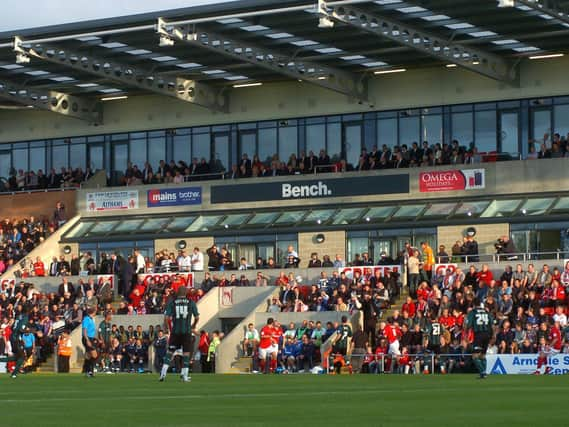Wage cap in place for clubs in Leagues One and Two


It means teams in the third tier will have a £2.5m wage ceiling, while Morecambe and their League Two counterparts have a £1.5m limit.
For their part, players won’t be restricted in terms of their salary provided their club operates within the limits.
Advertisement
Hide AdAdvertisement
Hide AdA salary cap has come onto the radar as most lower league clubs try to recover financially from the suspension of football as a result of the coronavirus pandemic - even if the idea has its share of critics as well as supporters in the bottom two divisions.
Morecambe boss Derek Adams, however, has previously said that any wage cap wouldn’t be an issue for the Shrimps.
EFL CEO, David Baldwin, said: “The term ‘salary cap’ is an emotive one, creating the impression of a restrictive measure but we are clear in our view that this is neither the objective nor the likely effect of these changes to EFL regulations.
“The financial impact of Covid-19 will be profound for EFL clubs and today’s vote will help ensure clubs cannot extend themselves to the point that could cause financial instability.
Advertisement
Hide AdAdvertisement
Hide Ad“Over the last two weeks the discussions amongst clubs in both Leagues One and Two have been healthy and constructive, allowing us to reach a clear consensus today and I am pleased that the clubs have determined to adopt the new approach.
“We will now work with all clubs, the PFA and, where appropriate, other stakeholders to implement the new rules and continue our efforts to bring long-term sustainability to the EFL.”
When calculating total salary spending, the cap includes basic wages, taxes, bonuses, image rights, agents’ fees, as well as other fees and expenses paid directly or indirectly to all registered players.
Payments directly linked to a club’s progression in cup competitions or promotion are excluded from the cap, while any income generated from players going out on loan is deducted from the club’s salary cap calculation.
Advertisement
Hide AdAdvertisement
Hide AdThere are also so-called ‘transition arrangements’ whereby any contract entered into either on or prior to today’s vote will be capped at an agreed divisional average until that contract expires.
Relegated clubs will be permitted to cap all contracts at the divisional average prior to the club’s relegation until those deals expire.
Should clubs break the cap by up to five per cent - or £75,000 in Morecambe’s case - then there would be a financial penalty.
An overspend of between zero and two per cent generates a so-called ‘overrun tax’ of 50p for every £1 in excess.
Advertisement
Hide AdAdvertisement
Hide AdA breach of between two per cent and four per cent would mean £1 back for every £1 over, while overspending between four per cent and five per cent would mean paying back £3 for every £1.
Fines paid will then be redistributed among clubs who operate within that cap.
Clubs exceeding a five per cent overspend would be referred to an independent disciplinary commission, although the EFL will monitor the cap on a real-time basis throughout the season.
Where breaches do occur, sanction guidelines are in place to be considered as appropriate by an independent disciplinary commission.